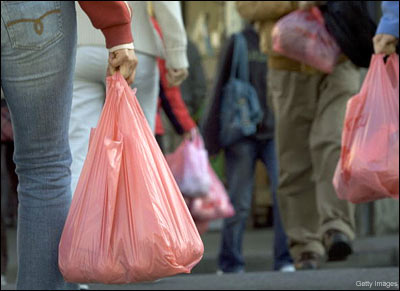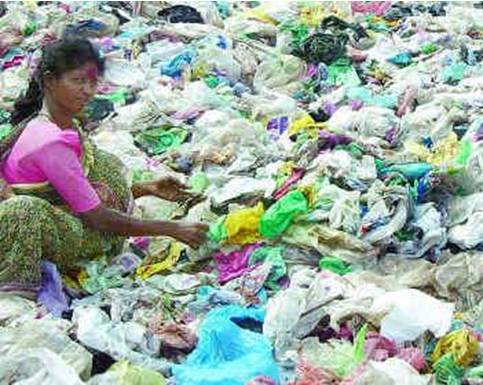|
|
|||||||||||||||||||||||||||||||
|
The War on Plastic Bags
Banning the Plastic Bag Easier Said Than DoneBy Charles Moffat - Feb. 2008. When I go grocery shopping I have to remind myself to take a pair of cloth bags with me. Sometimes I forget. The local grocery store charges 5 cents for every plastic bag, which is really inexpensive. No, my problem is what to do with all the damn bags after I get home. Currently they are shoved in the cabinet under the sink and squashed in there tightly. I use them as garbage bags for my bathroom and kitchen, but there is just so many of them I can't get rid of them all. The lowly plastic bag is also very difficult to recycle. There is no recycling programs for them and it is much cheaper to simply buy oil and make new plastic bags (polyethylene is a thermoplastic and we make 60 million tons of it per year).
It has reached a point where there is now many countries and cities that have either banned plastic bags or are in the process of doing so. In 2007 there was a lot of fuss about the "I Am Not A Plastic Bag" women's handbag which has since become a hot-selling fashion commodity (in a range of different colours). Here is a quick tally of what has happened: 1. San Francisco and Oakland (USA) have banned plastic bags. 2. China has imposed a levy on plastic bags and is planning to ban plastic bags nation wide in June 2008. 3. San Jose and Chicago are considering banning plastic bags. 4. United Arab Emirates is now charging a fee for each plastic bag. 5. In New Delhi it is a crime to distribute plastic bags, punishable by an approx. $600 US fine. 6. A small town in Scotland has started a semi-successful recycling program. 7. Whole Foods is banning plastic bags from its grocery stores.
8. Bengladesh completely banned plastic bags in 2002. 9. Several countries in the European Union has banned plastic bags and the EU is considering a complete ban. 10. Trader Joe's has stopped using plastic bags in its stores. 11. India, Australia and London England are all considering banning the plastic bag (London is also considering taxing it instead). 12. Ireland placed a heavy tax (33 cents per bag) on plastic bags, almost wiping out the market entirely. 13. Leaf Rapids, Canada banned plastic bags. 14. Numerous towns and cities worldwide are now considering taxes or bans. Overall there is a very strong drive towards cloth bags which can be washed, reused and easily recycled.
I should point out why the world is suddenly banning plastic bags. It is an environmental hazard to animals (who eat the plastic and then starve to death), it clogs up and dams rivers and sewers, creating flood, health and safety problems (in New Delhi floods caused by plastic bags killed dozens of people, hence why they banned it) and in Africa / North America plastic bags collect stagnant water which is a breeding ground for malaria / West Nile virus infected mosquitoes. Plus, plastic bags take decades to fall apart and are clogging up landfills. When they do breakdown they release toxins into the soil and water supply. Many retail groups oppose the ban, believing shoppers prefer plastic bags over paper or cloth. Twenty years ago everyone was using paper bags and I can still remember checkout people asking "Paper or plastic?" It should not be that big of a deal to go back to paper. Many stores already have switched to paper (or never switched to plastic in the first place). Want to help ban plastic bags in Canada? Send Prime Minister Stephen Harper an Email at pm@pm.gc.ca and tell him that you want him to ban plastic bags across all of Canada. Once it is banned in Canada numerous US states will follow suit.
Will Canada ban Plastic Bags?If China can ban plastic bags why can't Canada? On January 8th 2008 the Chinese government announced it would restrict the production, sale and use of all plastic carrier bags as part of an effort to reduce waste and ease pressure on the environment. While that decision earned kudos from the province of Ontario and city of Toronto yesterday, neither is contemplating a similar move. The plastic bag industry says banning free bags doesn't work and could backfire, but doesn't explain how or why. In Toronto a city task force is working on a plan to sharply reduce packaging such as bags, throw-away coffee cups and "clamshell" takeout containers, in co-operation with the retail and fast food industries. But the city doesn't have the sweeping powers the Chinese government is wielding, Mayor David Miller told reporters. "We don't have the legal ability to ban in-store packaging." Only the province or the government of Canada can do that. As for Ontario, Premier Dalton McGuinty gave China full marks for its June 1st ban on bags, he said Ontario will stick with the voluntary plan it announced last May to work with industry to cut bag use in half within five years. Ontarians currently use 2.5 billion plastic bags a year. Environmental activists say if voluntary measures don't work, they'll call for a ban. The Sierra Club said McGuinty could put more teeth in provincial efforts by requiring retailers to charge 20 to 30 cents a bag, as Ireland does. Most supermarkets in Ontario offer shoppers the choice of buying a reusable bag, bringing their own, or returning plastic bags to the store. Loblaw Cos. Ltd. said it's on track to achieve its goal of diverting 1 billion plastic bags a year from landfill. The grocer, which opened Canada's first completely bagless store in Milton last August, said it wasn't ready to release statistics yet. It has since opened five more such stores. So Toronto apparently can't pass a ban, Ontario is in the process of phasing out plastic bags and if you want faster results you have to go straight to the top: Canada's Prime Minister.
|
|
||||||||||||||||||||||||||||||
|
Website Design + SEO by designSEO.ca ~ Owned + Edited by Suzanne MacNevin | |||||||||||||||||||||||||||||||




